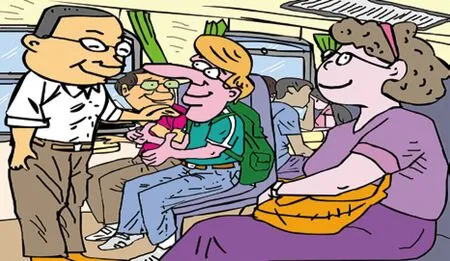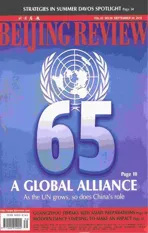The Real China, on Wheels
2010-10-14ByDAVIDSPARKES
By DAVID SPARKES
The Real China, on Wheels
By DAVID SPARKES
“Excuse me, you can sit here,”he said. The man had reasonable pronunciation and looked studious, with a blend of gray and black hair, a white shirt and a smile that made me feel as if I’d arrived for dinner in his living room.
But I hadn’t, and he didn’t know me.I looked around the crowded train carriage as it rumbled along, 30 minutes out of Shanhaiguan, the eastern start of the Great Wall in Hebei Province more than 310 km from Beijing. There were more people standing than sitting and we were in for a tough fi ve hours.
I had missed a seat as a result of my lack of organization—a debilitating condition of 30 years. I had had every chance to buy a ticket the day before, while there were still seats available. But I fly by the seat of my pants—and kick myself later.
“No, no. I couldn’t,” I said.
“Yes,” he replied with a smile. “You can sit here.”
“But it’s your seat. Really, I can’t.”
“Yes, please, have my seat.” We carried on like this for some time. This guy had taken the trouble to reserve a seat, and now he wanted to give it away. People were staring at me. This was awkward.
“You are tired,” he said.I gave in and sat down.This act of sel fl essness reminded me of a previous trip. During this year’s Spring Festival, I hopped on train from Taiyuan to Datong in Shanxi Province. I found my place,took out a book, put my bag overhead and sat down.
Just as I began to read, it suddenly dawned upon me: I was the human TV set.Every single person within 10 meters had their eyes on me. They had not only turned their heads, but also their bodies, to stare at me.
“Excuse me, where are you from?” asked a young woman.
“I’m from Australia.”
Everyone looked eagerly at the brave woman. “Ta shi aodaliya ren (He’s an Australian),” she said. “Oooh,” they replied,nodding their heads.
“Sydney?” she asked.
“No, Melbourne.”
Before long there was a semi-circle of people around me. A couple of chubby boys in the seats behind me had climbed up and rested their chins above my headrest, trying to take in the action.
“Excuse me, what is your job?” she said.
“I am a journalist,” I answered.
“Ta shi jizhe (He’s a journalist),” she said. “Ooooooh,” they hummed, nodding with enthusiastic smiles.
We all chatted away in the long journey,through our intrepid translator. She was a student, on her way back to Beijing, having spent the holiday with her family in Shanxi.Two other students drifted into the scene,speaking English.

LI SHIGONG
The crowd was mesmerized by the unfolding spectacle. They were in awe of the foreigner but they should have been more in awe of our makeshift interpreters.
I was impressed by their English, but what grabbed me was their no-guts-no-glory attitude to starting a conversation with a foreigner. It must have taken a rare combination of courage and friendliness.
Back on the Shanhaiguan-Beijing train,I was feeling happy to be seated. Everyone assumed the “human TV” position, including another batch of kids hanging over my chair and the one opposite.
My Good Samaritan stood by me at a comfortable distance.
“Excuse me, where are you from?”
“Australia.”
“Ta shi aodaliya ren.”
“Ooooh.” (Nod, nod, nod.)
And on we went…
One thing standing out for me on that train was the unbridled sense of community among absolute strangers. On Beijing’s subway, everybody ignores everybody—it’s a worldwide phenomenon. I was surprised to see once Chinese people climb on board a regional train, they engage each other like neighbors in ahutong.
I soon realized people all over the train were chatting to their fellow passengers, near or far. There was a lot of laughing. People offered snacks to each other, followed by the usual “No, no, I couldn’t.” “Yes, yes. Here take some.” “Well, OK. Just a little.”
Three or four times, I was approached by university students who wanted to chat, just like on the Shanxi train. Once again, the audience was enthralled. I began to feel the older passengers understood the signi fi cance of what these youngsters were capable of, and they were proud of their young compatriots taking China to the rest of world through conversation.
These youngsters conversed with warmth, intellect and sincerity, combined with reasonable language skills.Undoubtedly, China will fi nd itself in good hands as the decades tick by. It’s a shame their parents weren’t there to watch them.Could you imagine the pride?
I vowed to avoid fl ying around China—the train gets my vote. Give me the rattle of on old carriage, a sore backside and a good chinwag every time. If you want to see real Chinese people at their fi nest, take it from me:jump on a regional train.
EXPATS, WE NEED YOUR STORIES!
If you’re an expat living in China and have a story or opinion about any aspect of life here, we are interested to hear it.We pay for published stories. Submissions may be edited. E-mail us at contact@bjreview.com.cn
The author is an Australian living in Beijing
